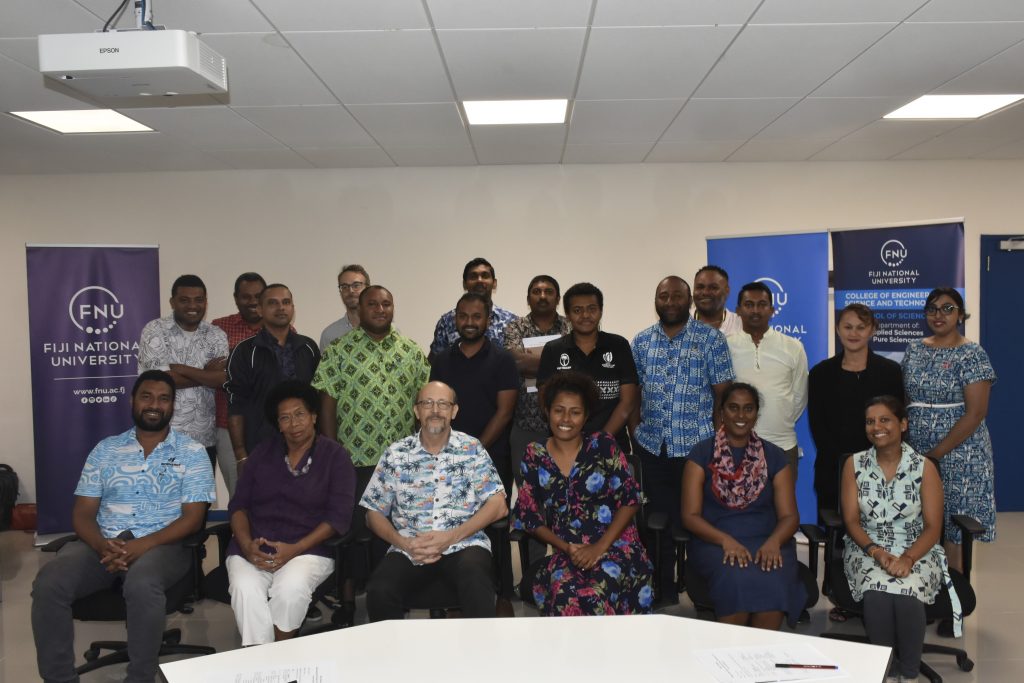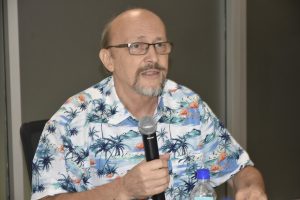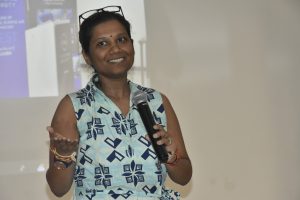

Participants at the Workshop.
The Fiji National University’s (FNU), College of Engineering, Science and Technology (CEST) organised and conducted a policy workshop on the project titled ‘Rolling out biogas digesters for clean cooking energy access in Kavewa Island in Fiji’.
The research would assist the villagers, government and other stakeholders, which would contribute towards the fight against climate change and towards using clean energy.

CEST Dean, Professor Tibor Pasinszki addressing the participants at the workshop.
CEST Dean, Professor Tibor Pasinszki, said the workshop was to inform local, national, and regional policymakers on what can be achieved by utilising clean cooking technologies in rural communities.
“This project started in April 2022 when an extensive review of key policy documents on cooking energy in Fiji was carried out, and one case study on Kavewa Island was conducted to understand the status, challenges, and opportunities for clean cooking energy access. The issue of clean cooking is not just about adopting new technologies; it is about the health and well-being of our people, the environment, and the sustainable development of our communities,” Professor Pasinszki said.
“Our combined efforts represent not only a commitment to improving the lives of our people but also a dedication to the United Nations Sustainable Development Goals, particularly Goal 7, which aims to ensure access to affordable, reliable, sustainable, and modern energy for all. Clean cooking is a vital component of this mission, and it requires the collective efforts of governments, NGOs, businesses, and communities.”
The findings from the research were that men were the head of 82% of the household, and the final cooking decision rested with the head of the family, resulting in a mismatch between cooking energy users and decision-makers. Every household could not preserve cooked food for longer due to the unavailability of refrigerators or pressure cookers.
On the island, 95% of households use firewood for all their cooking needs, and in addition, 50% of these households also use LPG in the rainy seasons or when there is the unavailability of firewood and tea preparation.

Dr Ravita Prasad presenting at the workshop.
CEST Assistant Professor in the Department of Pure Science, Dr Ravita Prasad, said policymakers should prioritise the implementation of clean cooking to increase access to clean and affordable energy in rural areas.
“The promotion of the use of biogas digesters as one of the viable solutions for providing clean cooking access in rural communities would help the Fiji Government meet several policy objectives by reducing the negative impacts of traditional cooking methods on health and the environment and improving the economic and socio-cultural well-being of the rural communities,” Dr Prasad said.
“Women and children should take a central role in ensuring access to cooking energy since they possess a profound understanding of the family’s cooking energy requirements, despite the traditional role of males as the heads of households. Leadership in cleaning cooking energy should prioritise the inclusion of women and children in energy policy discussions, particularly at the micro level.”
“The workshop’s main objectives were to share the project’s findings and get stakeholders’ feedback on the draft policy brief that the team had prepared, and discuss opportunities for future collaborative projects.”
The research was a collaborative project effort between the Cagimaiwai Women’s Club, the United Nations Development Programme, BioEnergy Insight and Fiji National University, including 3 academics from Ghana, Cyprus and the UK.
In attendance were the representatives from the University, Ministry of Agriculture, Department of Energy, Department of Environment, Global Green Growth Institute, Pacific Community, UNDP’s Small Grants Programme, Ba Industries Limited, BioEnergy Insight, Gender and Climate Change Initiatives, and Cagimaiwai Women’s Club.